20th Annual Great Defender of Life Dinner Honoring Thomas Brejcha and George McKenna
Rev. W. Ross Blackburn:
Thank you. Let me briefly give the Invocation. I’m always fascinated by that word—to invoke—especially when you think about what it might mean to invoke God. In effect, an invocation is to ask for the help of the Lord, and not only over this evening, but really for this cause, which is to defend the fatherless and to plead for the widow or, to read it, mothers in crisis and their unborn children. This is why we’re here. But to invoke the help of the Lord implies something, and that is that we go about God’s work, in God’s strength, and in his way. And with that in mind, I want to read Psalm number two:
Why do the nations rage
and the peoples plot in vain?
The kings of the earth set themselves, and the rulers take counsel together,
against the Lord and against his Anointed, saying,
“Let us burst their bonds apart
and cast away their cords from us.” He who sits in the heavens laughs; the Lord holds them in derision.
Then he will speak to them in his wrath, and terrify them in his fury,
saying,
“As for me I have set my king on Zion, my holy hill.”
I will tell of the decree:
The Lord said to me,
“You are my son; today I have begotten you.
Ask of me, and I will make the nations your heritage, and the ends of the earth your possession.
You shall break them with a rod of iron
and dash them in pieces like a potter’s vessel.” Now therefore, O kings, be wise;
be warned, O rulers of the earth.
Serve the Lord with fear and rejoice with trembling. Kiss the Son,
lest he be angry, and you perish in the way, for his wrath is quickly kindled.
Blessed are all who take refuge in him.
The Psalm describes the world that we live in—a world where those in power, whether elected or not, take counsel together against the Lord. So, you don’t have to be a “theorist” to believe in conspiracies. People have from the beginning of time conspired to do evil; it’s no different in our day. There are eight [prolifers] that Maria told me about, and I believe you’ll hear about it later, who are in prison, and we will pray for them. I suspect maybe Tom Brejcha will speak to this . . . [defending them] is what he does.
This describes the world that we’re in, that conspires against the Lord and against his people. So, what does God do about it? Well, he laughs at the pretensions of the rulers of the nations, and he will speak to them; he will speak to the nations in terror and fury and give them into the hand of his king, his Messiah, his Christ who will break the nations. In other words, the shedding of the blood of infants and the violation of their mothers will not continue indefinitely, but woe to those by whom it comes.
So, what is our part, what does it mean to do things in God’s strength and in God’s way? Well, listen again: “Now therefore, O kings be wise; be warned, O rulers of the earth. Serve the Lord with fear and rejoice with trembling. Kiss the Son, lest he be angry, and you perish in the way, for his wrath is quickly kindled. Blessed are all who take refuge in him.”
This is the voice of the church. It’s not the only voice of the church. For instance, the voice of the church is also a word of forgiveness and peace and new life to the weary and heavy-laden in this abortion-weary world. And only the church can speak that word. But the word of the church is also a word that the Lord’s Messiah, his Christ, reigns: “Kiss the Son, lest he be angry, and you perish in the way,” which is both a warning but also an invitation to the rulers of the earth. Now speaking such will be counted foolish by some, but many will take it seriously, and it will bring suffering. In fact, the persecution of prolifers is because the rulers of the world take it very seriously. But perhaps some will repent. In Jonah’s day, remember, the king of Nineveh repented and perhaps in ours [some will repent] as well, that’s God’s concern. But we also need to hear it too; that the Lord reigns, lest we get discouraged. See? Dobbs didn’t make anything easier, did it? We need to walk in hope, as Maria said. Blessed are they that hope in the Lord. We may wonder why God lets these things go on, but he will set things right. And we need to remember.
With that in mind, let us pray: Father in heaven, in the name of your son Jesus Christ, we give you thanks. You are the Lord and you have given us your Christ who will return and set all things right, who will wipe the tears away from the broken, and will set things as they should be. Thanks be to God. We thank you for the Human Life Foundation, we thank you Lord for their persevering work for nearly 50 years now. Guide, strengthen, protect them. For those who are in prison, suffering for being a voice for the voiceless and many others, we ask your blessing. For the pro-life movement and for the church, grant us strength, we pray, to hope in you and to be faithful in our day. And we also thank you for this food we’re about to receive, for those who prepared it, and those who serve it to us. May it strengthen us that we might serve you and one another well. We pray in Christ’s name. Amen.
Peter Pavia:
Thanks Maria. Thank you. And thank you ladies and gentlemen for coming together this evening for this elegant but important annual event. Any humbling association I can claim with the Human Life Review would be impossible without the tireless work of Mr. and Mrs. James P. McFadden to establish an intellectual community—the intellectual backbone of the pro-life movement. I am sorry I never had the chance to meet JP, but I do remember Faith with great fondness, smoking cigarettes in the kitchen of their rambling apartment up on the East Side. I miss her terribly.
 I mentioned our founders not to be maudlin but as a reminder that our inheritance is also our legacy.
I mentioned our founders not to be maudlin but as a reminder that our inheritance is also our legacy.
It is now my privilege to introduce Professor George McKenna, the first of tonight’s honorees. Mr. McKenna is Emeritus Professor of Political Science at City College of the City University of New York.
His startling rhetorical rigor has been spotlighted across the decades in no fewer than 20 articles for the Human Life Review. In advancement of this noble cause, this just cause, the cause of life, please help me to welcome George McKenna.
George McKenna:
To all the members and the leadership of the Human Life Foundation, I want to express my deep appreciation for the honor you have given me tonight. For 49 years and counting, the Human Life Review has been the leading voice in defense of the unborn and their mothers, and I am proud to have been associated with it for 27 of those years. All of us are so very grateful to Maria McFadden Maffucci, Anne Conlon, and their dedicated team for the wonderful work they have been doing all these years. Because that work and those efforts have borne fruit. At one stroke, on one day, in June of 2022, the Supreme Court finally relinquished the power it had seized nearly half a century earlier: It now put the issue of abortion squarely into the hands of Congress and our state legislatures. Abortion is no longer a constitutional right. It can be a right under state law, but it’s not welded any longer to our beloved Constitution.
I want to turn to some of the implications of that decision and some of the possibilities it opens up for us. But before doing that I want to move the clock back for a moment and tell you something that happened 28 years ago. In September of 1995, Atlantic Monthly magazine published an essay of mine pointing out certain similarities between today’s abortion controversy and that of slavery in the mid-nineteenth century. A couple of weeks later Anne called me up and asked if the Review could publish the piece. I said yes, and that was the beginning of my long association with the Review and its pro-life mission. Unfortunately, there are many people who oppose that mission. The night before my article appeared in the Atlantic Monthly my wife and I attended a faculty-and-spouse dinner at City College of New York, where I taught. We sat around for a couple of hours eating, drinking, and shmoozing. Sylvia and I got especially chatty with one of my CCNY colleagues and his wife. We all had a great time.

The following Monday I saw my academic colleague in the hall at City College. He had a mysterious smile on his face. He told me that his Atlantic Monthly had landed in his mailbox on Saturday morning, but his wife didn’t start reading it till evening because she liked reading her favorite magazine while lounging in bed. Anyway, she finally did pick it up and within minutes came running out of the bedroom asking, “Is this the same George McKenna we were with last night?” When he nodded yes, she shouted, “And I thought he was a nice guy!” (laughter)
The Dobbs decision last year probably didn’t do much good for that lady’s blood pressure. Because at one stroke the Supreme Court gave up the power it had to decide whether and in what circumstance abortion is justified. That power was now transferred to the states and to Congress.
Let’s start with the latter, with Congress. Technically, Congress could pass a law banning abortion nationally, but that’s not likely to happen. South Carolina Senator Lindsay Graham tried it last year by introducing a bill to ban abortion anywhere in the United States after 15 weeks of pregnancy. It went nowhere in a chamber dominated by Democrats, but even many Republican senators were happy to pass that hot potato over to the states.
So, practically speaking, it’s really in the hands of the states. OK, so how’s that been working out? Well, I do like the law passed just last April by North Dakota banning abortion throughout pregnancy, with rare exceptions, before a heartbeat can be detected. Some other states, such as Oklahoma, Iowa, Florida, and Idaho, also have robust anti-abortion laws. But at the other end of the spectrum, we have the abortion laws of California, New York, New Jersey, Illinois, and most of New England, which allow abortions up to the moment of birth. The rest of the states are at various points in between.
Last year’s midterm elections brought some sobering news for our side. Abortion was on the ballot in five states, and in all five, abortion advocates won, and that included Montana and Kentucky, states usually friendly to our side. To be sure, there were some bright spots: Several pro-life governors easily won reelection after backing strict abortion limits. Nevertheless, it’s obvious that we have much work to do in getting our message out there. Along the way, though, we do have some realistic guideposts for measuring our progress. One was set firmly in the ground some years ago by Pope John Paul II— SAINT John Paul if you please: He said it’s permissible for Catholic politicians to vote in favor of laws permitting abortion so long as the imperfect new law replaces a worse one. (I’m grateful to two of my colleagues, David Quinn and Wesley Smith, for pointing that out.) I’m convinced that that is doable in the near future in all or most of the 30 states with the worst abortion laws. Abortion proponents like to cite figures showing that a large majority of Americans want abortion to be legal during the first trimester of pregnancy. What they don’t like to acknowledge is that an even larger majority of Americans want abortion banned during the second and third trimesters. So the time is ripe for pro-life groups to bring their fight to the 30 states that permit lateterm abortions. Fact-checkers at the Washington Post—hardly a conservative newspaper—have concluded that the U.S. is one of only seven countries in the world that allow abortions after 20 weeks of pregnancy. The other six, by the way, are North Korea, China, Vietnam, Canada, Singapore, and the Netherlands. So it’s the abortion industry and its influential friends on one side and the pro-life movement on the other. I’m going to do whatever I can, from picketing to praying, to help our side, but I can’t predict an outcome. The one thing I am sure of after all these years living here is that Americans love life. Their social mores have been shaped by their celebration of life as an unalienable right. That is why Americans are so uneasy about abortion. They know that abortion is a killing process. The abortion spokesmen know it too, which is why they go to such great lengths to hide it. Abortion is a “procedure,” a “reproductive health measure,” a “choice.” They don’t seem to like the actual word “abortion,” which is why they resort to euphemisms so often. The most puzzling euphemism is the term “reproductive care,” which they use to describe a procedure aimed at STOPPING reproduction. That’s the reason why they won’t compromise whenever anyone suggests a ban even on lateterm abortions. They know that, once they do that, they’re in trouble. Why ban very late-term abortions? Well, presumably because there is now, finally, at long last, a human being living in the womb. But if it’s a human being at, say, eight months, why not at seven? Or five? Or three? And so on. Keep that up and eventually some genius is going to say, “Hey, maybe it’s been a baby all along.” I mean, follow the science, guys! (laughter) How many times have you heard that? Well, now it works in our favor.
That is why I have suggested that the abortion lobby is playing with a weak hand. Americans love life, especially innocent life. They hate to see it destroyed. And yet some states of our nation have on their books laws that permit the killing of children in the womb after 24 weeks of pregnancy, laws comparable to those of North Korea, China, and Vietnam but banned by almost every country in Western Europe.
So we have an anomaly here. We have a nation of people who love life, yet many states in that nation have left their doors wide open to late-term abortions. So, we have our work cut out for us. If anyone ever asks me—and so far no one has—I would suggest this strategy: Start with the worst of these states: California, New York, New Jersey, Illinois, and most of New England—and expose them for all to see. That very exposure can take on a life of its own as more and more people hear, some for the first time, what the hell has been going on in their legislatures over the past ten years.
But whatever our strategies, we’re now in a position to move forward because abortion is not a constitutional right. Abortion has been shaken loose from its proud perch in the U.S. Constitution, so we now have it in our power to force it out the door in at least a good number of states. Then, in due time, we’ll come back for the rest.
Thank you very much.
Ann Scheidler:
Thank you, Maria.
It is such an honor for me to have the opportunity to introduce my dear friend Tom Brejcha.
My copy of Human Life Review showed up in my office last week, and so I, of course, went right to the article that he wrote for that edition, and I started reading it. I hope that you have read it. If you haven’t, be sure you do. And I want you to know it’s about half the length of the original article Tom wrote because he never writes anything short and condensing 28 years of a court battle into like eight pages is, you know, difficult. But if you want the longer version, you just have to contact Tom and he’ll be happy to e-mail it to you.
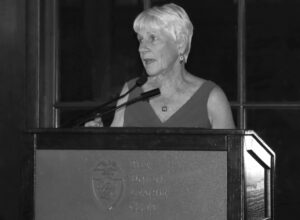
Anyway, so I started reading the article and it prompted me to go back to my husband’s famous journals that he used to keep on everyday life—on everything. And I wanted to know:
When did he meet Tom Brejcha? Well, it turns out it was August 14th, 1986. And let me tell you how we came to know him. Joe was sued by the National Organization for Women in June of 1986. It was originally an antitrust suit, and we had a couple of different nonprofit law firms that
were interested in representing him. It ended up being Americans United for Life, and although they had a lot of experience with legislative work, they didn’t actually have litigation experience. So I called my brother-in-law, who was an attorney. I said, do you do antitrust work, and he said no, but a friend of mine just had a case before the Supreme Court. It was Tom Brejcha. So, Tom met with Joe and changed his life forever. He probably has some second thoughts about that lunch, that is, I think it was a lunch meeting.
The first time I met Tom, for some reason I was going to go to court with him to file for—I think it was a status hearing or something. I go to his law firm. In his office, every surface, every chair, the desk—everything—is piled with books. The books are all full of yellow post-it notes, pages of yellow post-it notes. And I find this little, tiny spot on the edge of a chair in front of some books, and on the table is half a muffin. And Tom says, oh yeah, you can sit there, and that’s for you, meaning the muffin. The muffin is for me! (laughter)
He’s furiously typing because he’s, you know, coming up with new ideas constantly. So last minute, we’re due in court at 9:00 in the morning, it’s like about 20 minutes to 9:00 and he’s still typing away. Then he pulls the document off of the printer, and off we go to court. And that was the first of many, many such days spent with Tom.
Tom is brilliant. And often distracted because he’s thinking about new angles to the cases and his brain is totally packed with facts and cases and history and books—he reads constantly. And, as I came to know, he is also a sucker for a person in need. He can’t say no, and I am forever grateful for that. Tom Brejcha is the personification of a good man. He’s a devoted husband and father, a truly brilliant lawyer and a true friend. When the cost of representing Joe Scheidler became too much for his law firm—we couldn’t pay anything—the partners told him he had to make a choice: He had to either quit the firm or quit the case. And he opted to quit the firm.
Now, you can imagine what a huge economic sacrifice that was. I mean he had a relatively steady salary as a business attorney in a law firm in Chicago, and he’s stepping down to represent someone who has no money at all with no apparent ability to pay him. But he did it, he stuck with it and along the way, you know, he got a lot of notoriety. And then we established the Thomas More Society to continue representing Joe. And Thomas More, I think, now has something like 120 pro-life clients, defending those whose rights are being trampled on. He’s also gotten a ton of wonderful young lawyers who want to work for Thomas More, partly because they really believe in the cause, and partly because they really want to work with Tom Brejcha. Help me welcome Tom Brejcha.
Thomas Brejcha
Thank you very much, Human Life Foundation. It’s a wonderful honor you bestowed on us, and on our Thomas More Society, and I accept it with grace. But believe me, it belongs to the heroes whom we represent; many of them are here tonight. I’ll mention a few of them as we talk about our cases. I’m a soft touch for a hard case. You know, who could believe an anti-trust case against a pro-life activist trying to save babies’ lives? It was an abomination, you know.
But you can’t argue in court that way. We had obvious defenses, thanks to Americans United for Life, a pro-life firm then based in Chicago. They asked me to get into the case. I had great help from people like Clarke Forsythe, Senior Council of AUL, who is here. (applause) Thanks, Clarke. He’s another who was given this honor before, well-deserved. And I’ve had terrific support from a lot of wonderful young lawyers, men and women lawyers, over the years.
We finally did prevail in Scheidler—the article is in the Human Life Review. Thank you for publishing it. And it’s the short version; the long version went on for 28 years. We lost. The lessons are great: persistence, persistence—we won. We finally got the case thrown out of court on grounds that were obvious after five years. It was affirmed on appeal to the Seventh Circuit Court of Appeals, but oh, heavens, the Supreme Court granted review on the RICO case. We lost 9 to nothing. We didn’t give up; it went back down. It was a tough time, and we kept on. We went through a big trial. Racketeering charges were added. Imagine, people at the ABA convention I used to attend would say, Well, what kind of law do you do? I said I’m from Chicago, I do racketeering law. (laughter) And heavens, well, we won—we won 8 to 1. And then, my God, the lower court tried to overturn the Supreme Court.
People look at me like I’m making something up. It’s true. It’s the reason that Sotomayor is on the Supreme Court—because the head of the panel in Chicago was Obama’s first choice to be his nominee, and they said there is something she did in that abortion case in Chicago. Well, she tried to overturn the Supreme Court. It was a good bet because we’d been up there twice.
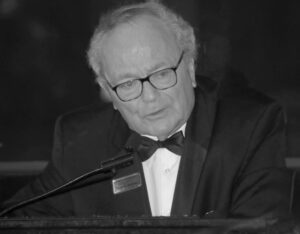
I don’t know of any case—people tell me they’ve checked—that’s been there three times. It was a good gambit that it wouldn’t be before them again, but she lost the gambit. We went up again; we won unanimously.
But let me hurry on, I do want to thank Consistent Life. They used to call themselves Seamless Garment Network. Carol Crossed is here from Rochester. (applause) Carol, you won the case, and you know that. Carol put an ad when we lost 9 to nothing in the New York Times, and it found its way to me, and there it was upbraiding the Supreme Court decision calling this nonviolent protest racketeering, and my heavens, it was signed by people like Joseph Lowery, executive Director of the Southern Christian Leadership Conference, Ramsey Clark, former attorney general, and Fr. Dan Berrigan, Jesuit. When it came time to go to trial, I called those people, and they rallied in our support. Thank you, Seamless Garment Network.
A great event happened during the argument before the Court. The Solicitor General of the United States—his name was Ted Olson; you may remember him from Bush v. Gore—argued against us, against us on the key issue, until Ruth Ginsburg posed this question to him: “Mr. Olsen, could your theory have been used against the civil rights protesters?” And he had to say, “Well, yes it could.” He started to explain, and she cut him off. That exchange was quoted in the Supreme Court report of the case because Ginsburg and Breyer filed a concurring opinion and focused on that response. They also joined the majority opinion of the eight justices, written by Rehnquist. So, it helps to reach out to the other side, if that’s what they are, you know, because now we have these great divisions, and we should be as bipartisan as we can and broad-minded in our advocacy.
You know I’ve got a laundry list of cases and I’m going to jump quickly because you’ve got to get on with the program. But we have probably 10 or 11 cases here in New York. I went to law school here—let me be quick about that, at NYU law school. I had a Root-Tilden Scholarship. They wanted to bring folks to NYU from the hinterland. One of my classmates was a fellow named Giuliani. I think you may have heard of him. Class of 1968. I’m an old geezer. I feel bad for Rudy now, he’s going through a tough time. Another classmate was Norm Seigel, head of the ACLU. And Norm Seigel gave Rudy, when he was mayor here, a lot of trouble about, you know, stop and frisk laws and so forth. That was a different era, was it not? But I didn’t realize at the time that NYU law, when I was there, made me uncomfortable. Why so? I couldn’t put my finger on it. I was elected the class representative, and yet it was difficult. Well, there’s a book by David Garrow, biographer of Martin Luther King, called Liberty and Sexuality—I recommend it—about how Roe v. Wade came about. Well, guess where it started. At NYU law school. And when was that? In the ’60s. There was a guy, one year ahead of me, that Garrow credits for coming up with the theory of the permutations and the, you know, emanations that formed the swampland basis of Roe’s reasoning. So, no wonder it was uncomfortable. But in any event, at the time I didn’t know that, and I went on to be a business lawyer.
But I’m a soft touch for a hard case, so I didn’t go back to my law firm Kirkland, a big firm in Chicago. I went off to, well—I had to fight. Rudy went to Nixon’s law firm; I went to Vietnam. I came back from Vietnam, and there was Rudy on TV as Assistant Attorney General for John Mitchell, a senior partner at the Nixon, Mudge, Rose, Guthrie and Alexander law firm. I joined a small firm. The head guy was Barnabas Sears, picked as the special prosecutor in Chicago of the police raiders who killed the Black Panther leaders. So, I had a bit of a background in, quote, civil rights law. It was really criminal law. Sears hit a wall. This was not a case hospitable to the Cook County establishment where I grew up, and where I live now. But in that law firm I had a senior partner, Jim Fox, a true Christian, devout Catholic, and when they asked me if I could help with Scheidler, he said sure, go file on appearance, we’ll back you up. Well, it went on for 28 years! After 10 years of, quote, pro bono work, the firm had good reason to say, Tom, you better quit the case or quit the firm. So, you know my dear wife, Debbie, couldn’t be here because she’s going to have knee surgery; she wanted to come. But she supported me then, although when I told her I resigned from the firm, she said, “Well, Tom, go back tomorrow and you tell him you’re un-resigning.” We had our older guy who was going to Notre Dame. It wasn’t cheap. She had a good, steady job, and we made it. And Ann and Joe came through for us and set us up as a nonprofit. So that’s how Thomas More started.
What are our cases? These are very important cases. And I say cases are narratives. They shape the nomos—the normative universe in which we live, which is to say, the culture. So that’s the way we pursue these cases, not just to win/lose, but to make some points. The Church at the Rock case— my goodness, it took us a long hearing before the Eastern District of New York and Brooklyn. Leticia James was undercover, getting these people from this beautiful integrated church on video [peacefully protesting outside a Queens, NY, abortion clinic] to show that they interfered with access, violating the law. Well, they did not. The judge had a twoto-three-week hearing; ruled for us. It went up on appeal; Guido Calabresi, former dean of Yale Law School, took a year to rule that the judge was wrong. We disagreed. We filed a motion to reconsider by all the judges on the Second Circuit down at Foley Square. And, well, guess what, Judge Calabresi himself wrote a new opinion and said, you know, I made a mistake, I was wrong. And we won. And then Leticia James gave up. But she’s still at it. There’s the Boss Bill, and we’re happy that Chris Slattery and his wife, Eileen joined us. (applause) I hope they’re still here, maybe they couldn’t stay. But Chris has been stricken. He runs Expectant Mother Care here in Illinois—New York, sorry—a big chain of pregnancy resource centers, and they took three years to decide that case. But they held that requiring pregnancy resource centers to hire people who have had abortions or advocate for it was indeed a violation of First Amendment rights. And now it’s on remand to the trial court again and will also be up for consideration of the New York City version of the Boss Bill. So even when you win, the cases sometimes go on.
Our wonderful lawyer Chris Ferrara is now going after Westchester, which passed a terrible law limiting sidewalk counseling, which is a last-minute plea to moms to save their children. We’re going to win that case. We’re fighting the Reproductive Health Act with Feminists Choosing Life of New York, in Smith v. Hochul. We’re on appeal on one issue, we lost on some others, but the case is still going on. We keep beating these drums because you can’t stop beating the drum. When you beat it loudly and long enough, people hear, and they hear this message of life, that is a winning message. It’s a winner, so we have to keep at it.
Now, Leticia James is after the Red Rose Rescue people—Ferrara is defending that for us. She’s trying to shut that down, she’s not going to succeed. Jim Havens of Rochester runs the Men’s March down in DC, maybe elsewhere too. He was our lead plaintiff, and he just defeated, again in the Second Circuit—we do a lot of business up there in Foley Square—where they said an old ban on picketing against Operation Rescue, which goes back to my era, could be applied to Jim, who had nothing to do with Operation Rescue back then. So, our gentleman litigator Tom Olp took on that case. We call him a gentleman warrior. It took three and a half years for the Second Circuit to rule in that case. Jim Havens won. Why did it take three and a half years? Something is going on. These things are percolating, even among the justices of our courts of appeal. Something is changing. Keep beating that drum.
The pregnancy resource centers in New York, generally, have now been attacked by, guess who, Leticia James. And she sent a questionnaire that’s a Trojan horse. She’s obviously about to pounce on them and we’re helping the PRCs together to fight off that attack. There’s violence against the pro-life people, a firebombing in Buffalo. CompassCare was bombed in the middle of the night. Thousands of dollars in damage. Jim Harden—Reverend Jim Harden—has our support. In any event, they [CompassCare] are suing two people who were found on the security cameras defacing the sign outside his clinic. We call that a violation of the FACE Law, impairing access, because if you can’t have a sign, your access is impaired, is it not?
So that brings us to the FACE cases, and you know we have these people who are now in jail, including Joan Andrews whose husband, Chris Bell, is here. We’re praying for you, Joan, and for the others. And my tiger litigator, Peter Breen, who’s here, tells me that the other side has filed their brief. We’re trying—to use the old term from Cook County—to spring them. They were incarcerated immediately; we think that was in violation of the law. And, of course, we think the FACE Act is unconstitutional and we’re going to press that on the appeal of the merits, if there is a sentencing which will be coming up after this initial appeal is resolved. Now we have so many other cases—I can’t tell you about all of them.
But let me tell you, there are attacks going on against pregnancy resource centers that are just abominable. In Illinois, Peter Breen just defeated a law brought by our version of Leticia James, Kwame Raoul, Attorney General. The judge said this was a stupid law and plainly (at least we think it looks like it will be found) unconstitutional. But the whole case isn’t over. Now Peter just told me on the phone they said they’re going to take 25 depositions regarding NIFLA (National Institute of Family Life Advocates) PRCs in Illinois. Well, see what they’re trying to do. They’re going to wear us out. They’re going to raise the price of defending these people, and we’re going to get our judge to stop it. It’s an abominable effort to fight people trying to save lives and they’re using money to do it.
In California, now—and this is the end!—Heartbeat International has been sued by their version of Leticia James, Rob Banta, the Attorney General there, and we will defend Heartbeat. They’re saying that it’s wrong and a fraud to the people of California to say the abortion-pill reversal will save lives. Well, the short answer to that is that it has saved many lives. And to hear more about it, read the Human Life Review.* So, we’ll have expert witnesses in there and we’re going to have, maybe, some of the moms whose babies were indeed born by means of abortion pill reversal. What better evidence that this is not fraud. This is the truth. And the truth will prevail. So, thank you, thank you very, very much, and let’s keep fighting.
*See Julia Duin’s Spring 2023 article:“Internet Giants Censor National Abortion Debate.”
George McKenna: A Coda
Alas, Covid sent me to bed—and to sleep—for several days last October, causing me to miss both our annual dinner and the pleasure of introducing honoree George McKenna, a brilliant champion of the unborn and cherished friend. I “met” George back in 1995 when I called to ask permission to reprint his Atlantic Monthly essay “On Abortion: A Lincolnian Position” (Winter 1996). J.P. McFadden had recognized its importance and wanted it in the Human Life Review, the journal he founded because, as he put it, there had to be a record of the abortion debate so no one could say they “didn’t know” what was going on.
At a National Review Institute dinner in D.C. last spring, one of my tablemates was Michael K. Bishop, a Lincoln historian and former executive director of the congressional Abraham Lincoln Bicentennial Commission, who told me he well remembered the jolt George’s Atlantic essay gave that debate back in the nineties. “Mr. McKenna’s policy recommendations,” Mr. Bishop subsequently wrote me, “were Lincolnian in both their moderation and moral clarity. Any politician who followed them faithfully could, like Lincoln himself, expect to be attacked from both sides of the political spectrum. But the ultimate goal would be worth the slings and arrows along the way. Congratulations to George McKenna for having successfully recruited the greatest American president—the Great Emancipator—to another noble cause.”
A decade later, another essay of George’s, this one written for us, caught the eye of the late Fr. Richard John Neuhaus, as eloquent a prolifer as ever was. “It’s galling,” he admitted in First Things, “when a good friend submits to another publication an article that we would have loved to publish.” The piece was “Criss-Cross: Democrats, Republicans, and Abortion” (HLR, Fall 2006), which, Fr. Neuhaus wrote, was “about as fine a treatment of important aspects of how we got to where are as I’ve ever read.” In his most recent essay for the Review, “Getting There,” written after the 2022 Dobbs decision overturning Roe, the seasoned political scientist outlined a bracing strategy for taking the fight for life to the states.
“Man in full” is an overused epithet but not when the man is George McKenna. One of George’s several books, a debate-style reader (with Stanley Feingold) titled Taking Sides: Clashing Views on Political Issues, went through 18 editions and has helped scores of college students learn not only how to think about controversial topics like abortion but also how to respect the thinking of others. George, along with his wife Sylvia—also a friend—attended the March for Life for decades and often prays outside a local abortion clinic with one of their daughters. After forty years in academe, Professor Emeritus McKenna spent the next seventeen volunteering at Office of Concern Food Pantry in Englewood, N.J., from which he retired as director in 2019. We pray that George doesn’t entertain the idea of retiring from writing for the Human Life Review anytime soon.
—Anne Conlon, Editor
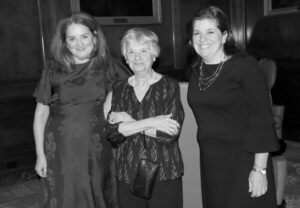
Sylvia McKenna with daughters Laura McKenna (l) and Maria McKenna Brockmeier
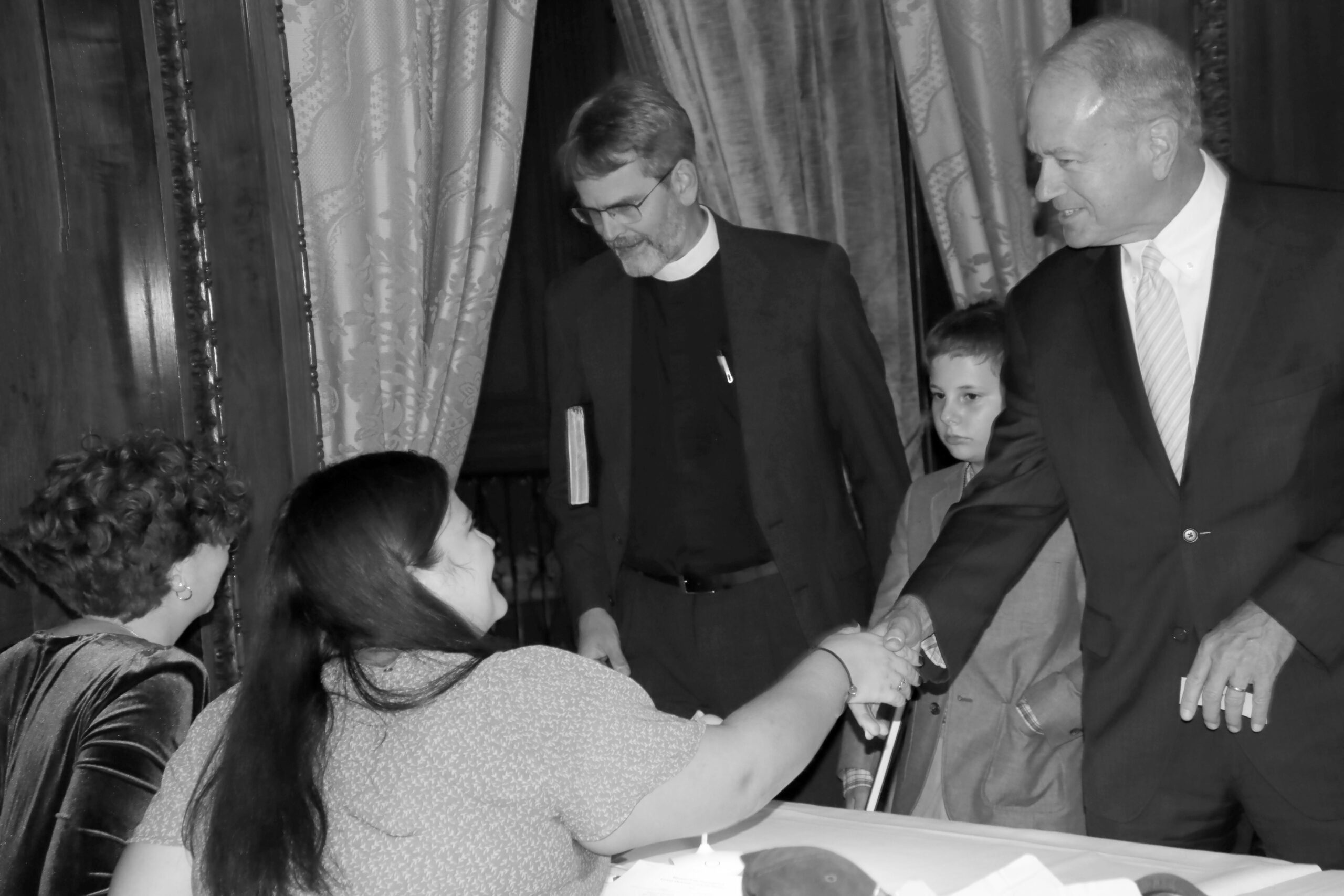
Dominique Cognetti and Anna Maffucci greet Rev. W. Ross Blackburn and son, and Clarke Forsythe

Pat O’Brien and Maria chat with NEWSworthy’s Madeline Fry Schultz

Thomas More Society Attorney Peter Breen (center) with associates Joe Barnas and John Phillips

Catherine Dillon (r), with Mary Lou and Marc de Venoge
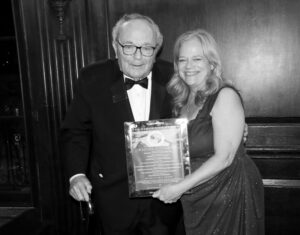
Congratulations Tom Brejcha!

Cecile Thompson, Rev. Victor Lee Austin, Rev. W. Ross Blackburn, and Rose DeMaio









